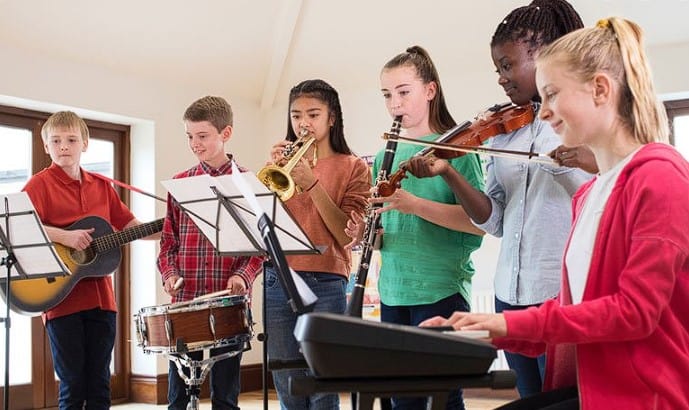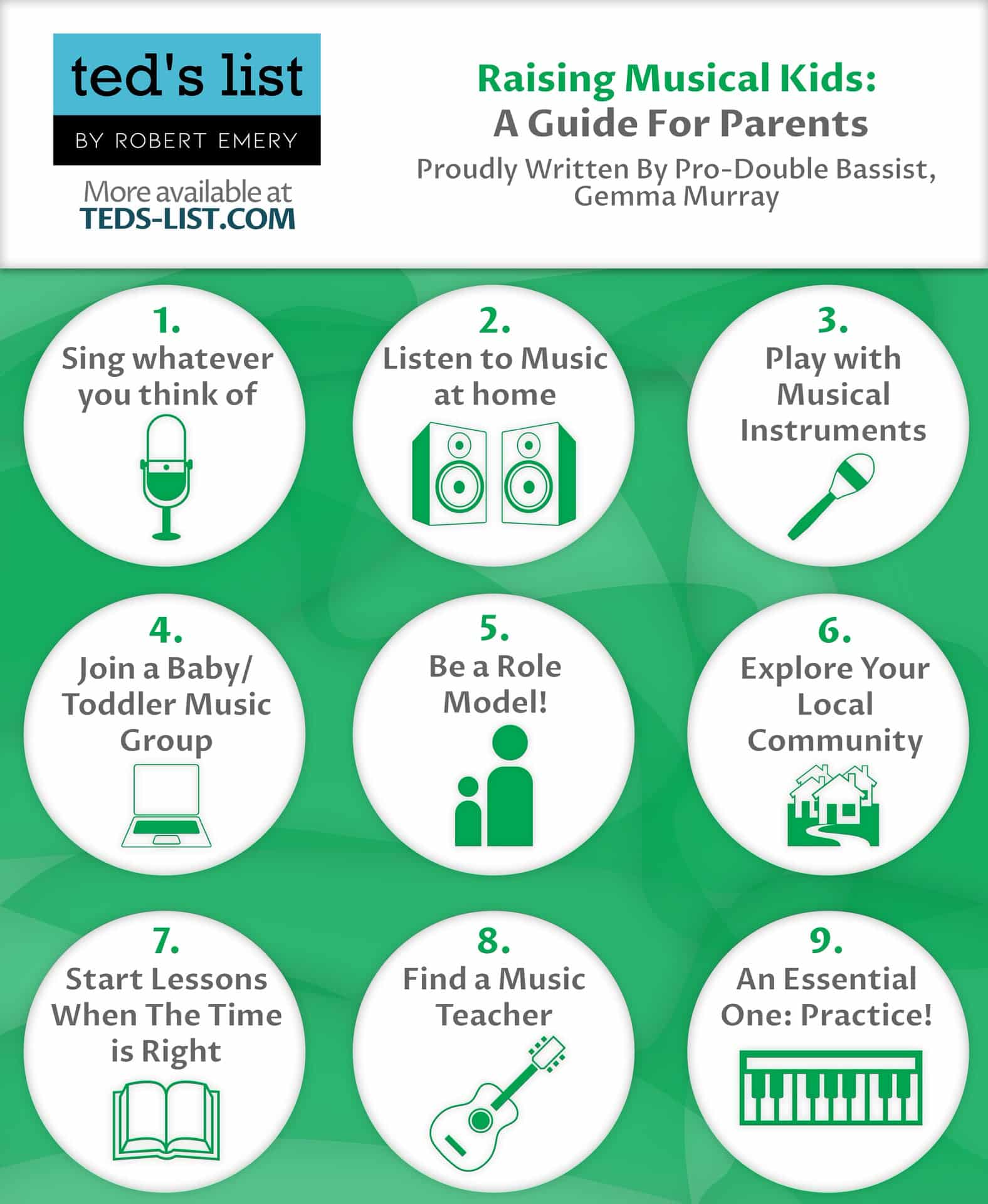Ever wonder how to support a musical child without driving them (and yourself) up the wall? Let me tell you, I’ve been there, and it’s quite the ride!
Spotting and nurturing musical talent in your child is an adventure full of highs and lows, but the rewards are incredible – not just for them but for you, too. Supporting a young musician isn’t easy, from dealing with endless practice sessions to keeping them motivated when things get tough.
Emotional support can enhance their energy and ambition, helping them overcome stress and boredom. Imagine seeing their eyes light up as they master a new piece or perform on stage. That’s pure magic!
This article will guide you through practical tips and tricks for making music a joyful part of your child’s life. Ready to explore? Let’s make your musical journey a harmonious one!
How Do You Raise Musical Children?
ONE
Some people believe that kids are either naturally musical or not. I think they are wrong! In my experience, exposure to music benefits all children in some way, whether that is through formal instrumental studies, going to concerts and gigs, or simply singing along to music on the radio or television. Most importantly of all, they enjoy it too!
In my own family, I have seen how my children’s love for music has been nurtured through regular singalongs during car rides and impromptu dance parties in the living room. It’s been a joy to witness how this exposure has sparked their curiosity and passion for music.
With music, the key to success is familiarity, and the most musically confident kids are those who have been exposed to music at home from an early age. It doesn’t mean that each child has to begin formal music education, but there are many ways to achieve exposure, as you can read below.
The Science Of Why Music Is Important
TWO
In October 2020, Harvard Medical School published this article describing several exciting ways in which music is good for the brain.
Playing, singing, and listening to music develops and strengthens the brain’s networks, giving musical kids a significant head start with reading books, comprehension and pattern recognition. Learning to play music also improves physical coordination and fine motor skills. This is great for sport and handwriting alike!
These benefits continue into adulthood and the majority of people who were exposed to music in childhood report better memory and cognitive function than those who were not. Music also provokes an emotional response, improving the mood and often underpinning good mental health, so raising musical kids will undoubtedly benefit them in later life as well.
What You Can Do To Develop Musical Children
THREE
A. Sing
But where do I start raising musical kids? I hear you ask. Despite knowing the many benefits of music education for kids, it can be difficult for parents to know exactly what to do in order to support their music learning and provide the best possible experience. Fear not! We’re here to help with musical kids a guide.
1. Create A Musical House
First and foremost, start at home! The confidence developed by early exposure to music at home is worth its weight in gold later on. Creating the best musical house is perfectly possible for any parent, regardless of your own background. Make music part of your daily life and various ways, and for many of them, you don’t need to be a musician yourself. Just follow the ideas below:
A. Sing
The most important one! Anyone can sing – you don’t need any books or teachers for this one, or any experience. Just sing whatever melodies come to your head – you can even make them up with no problem. And you will certainly get positive feedback from your child – after all, a parents’ voice induces trustworthiness and comfort in their child. Kids who grow up hearing singing and being confident using their own voices will make better progress when the time comes for them to play an instrument too.
Listening to and singing nursery rhymes together from babyhood is a great first step to raising musical kids, but singing along to the radio also provides excellent options!
Making music part of enjoyable family time will also foster positive associations and enthusiasm. Vocal quality is unimportant here – the vital outcome is a child who is confident using their voice to express themselves musically. Refinement can come later.
B. Listen To Music
Again, this is all about building familiarity and confidence in your child. We are constantly exposed to music through content on the radio, TV, films, and video games, and it’s easy to focus your child’s attention by starting an age-appropriate conversation about what kinds of music they enjoy and why. For children to enjoy music, it is important to find a style matching a child’s personality.
As your child grows, take them to see live music if you can: orchestral concerts, musicals, opera, ballet, jazz or folk nights, brass band competitions or pop music shows. Try to expose them to the widest range of music possible.
C. Play With Musical Instruments
No skill is required for this one! Not every parent is a musician, but simple childhood instruments such as drums, shakers, scrapers, kazoos and bird whistles are readily available on www.gear4music.com. You can also purchase an instrument to play at your local music shop and provide an excellent introduction to music; it doesn’t need any specialist tools.
Let your child explore the different sounds freely, and ask them to describe them. Can they make a loud sound? How about a quiet sound? Older kids may be able to play simple rhythms using words: “apple pie and custard” is a particular favourite of mine.
Watch your child’s personality to finding musical instruments they enjoy and see your child’s musical abilities grow.
2. Join A Baby/Toddler Music Group
Just as it is essential to read books to young toddlers, thinking about music and children should begin when they are still babies. It can be difficult finding musical resources, so music groups for young toddlers are bound to exist near your community, and a quick internet search will help any parent find the best options for you. The structure and content of a structured music session will give you some ideas of how to build on and develop your musical exploration at home, and they may have access to a more extensive range of instruments for the kids to try.
Not only this, but attending a music group will also help your child develop critical social skills and teamwork as they get ready to start school. Again, this social aspect of music-making fosters positive associations in kids, and you may find that you make friends too!
3. Be A Role Model
Even if you don’t feel particularly musically confident yourself, a parent modelling a positive and supportive attitude to a child’s musical endeavours will enable them to grow in confidence and skill from their first sounds on a shaker right through to formal music education. Children learn from copying, and if you value music, your child will, too.
It seems common sense that parents who play an instrument or sing share this experience with their children. But if you count yourself as one of the many parents who are not confident enough to do so, don’t be afraid! Let them see the real benefits of music-making in your life and give them experiences and opportunities of musical abilities coming to life.
4. Explore Your Local Community
Check out what’s on your doorstep! Maybe a neighbour offers violin or piano tuition, or perhaps a friendly local music student could sit with your child while they practice. See what kinds of live music are provided at the venues in your area, or if there is a choir, an orchestra, band, or other groups that you or your kids could join.
A visit to the local library is also worth a trip – not only can parents find a book or two about music and music education, but it is also a great and free way to finding musical resources.
In raising a musically gifted child, it is important to understand how to support their unique talent. To support a musical child, you can encourage them to participate in school or community music programs, such as choir or band, where they can further develop their musical abilities and interact with peers who share their passion.
5. When To Introduce Music Lessons?
When should a child begin music lessons? That depends on many factors. Music tuition on the piano or violin can be started from a relatively young age. Many children begin at around five years old, but some start even earlier! Other instruments require more physical strength to play, and some (especially woodwind and brass) require children to have their adult teeth when they start, so you wouldn’t be able to find a good teacher before that age anyway.
Children do best when learning something they enjoy, even if this means waiting until they are seven – or even older – to start with the right instrument. All instruments require concentration and focus, as well as regular practice between lessons. As a parent, you will be the best judge of exactly when your child is ready to begin music lessons.
6. Find A Music Teacher
Word of mouth is best, and if you are already part of a music group for younger kids, it is worth asking the other parents if they know a music teacher they would recommend. Local music shops often hold a teacher database too, and can usually pass on an email address.
Teachers also advertise online, and a website such as www.musicteachers.co.uk will enable you to search by both instrument and area to find the right teacher.
It is also worth speaking to the child’s school or the local Musical Education Hub; many offer music tuition already or are able to arrange it for you. Some areas also have music schools that offer group lessons on a Saturday or weekday afternoon – a great way for a child to dip a toe in before committing to private lessons.
Parents should be able to arrange for the children to have some trial sessions to see if the educator gets along with the child’s personality.
7. Practice
Once you have chosen an instrument and found a music teacher, even the most musical child still needs good quality regular practice in order to make the best progress. Find a quiet and calm place in the house and help them schedule practice at a set time within their day so they can feel confident about what to expect.
It’s best to aim for a shorter session (10-20 minutes initially) at least five times per week, rather than a longer session less regularly. This will improve focus and enable swifter progress. Parents can encourage their children to try practising a different piece or technical point in each session to keep things interesting too!
It’s important to note that one drawback of regular practice is that some children may feel pressured or stressed by the need to maintain a consistent practice schedule. It’s crucial for parents to strike a balance and ensure that the child’s enjoyment of music is not overshadowed by the demands of practice.
Raising musical kids a guide for parents
Summary
Raising musical children is an excellent way to give them a head start in all areas of life and is possible regardless of your own musical background.
I have personally witnessed how music has enriched children’s lives in various ways, from boosting their confidence to improving their focus and discipline. It’s truly rewarding to see how music has become an integral part of family life and has positively impacted children’s overall development.
I hope you have enjoyed this article – Raising Musical Kids: A Guide For Parents – and that the ideas I have suggested work well for you and your kids and help bring the joy of music to the front of your lives!













